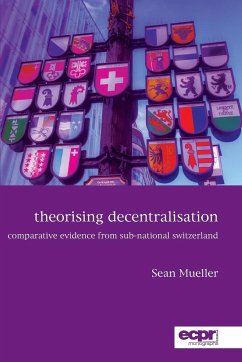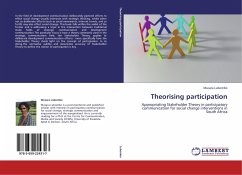
Theorising Decentralisation
Comparative Evidence from Sub-National Switzerland
Versandkostenfrei!
Versandfertig in 1-2 Wochen
52,99 €
inkl. MwSt.

PAYBACK Punkte
26 °P sammeln!
This book seeks to explain centralisation and decentralisation across the 26 Swiss cantons using sociocultural, political-ideological, and macro-structural approaches. Centralisation and decentralisation are conceptionalised as having institutional (polity), functional (policy) and actor- and process-oriented dimensions. When decentralisation is first predicted cross-sectionally using linear regression models, three significant independent variables emerge: political culture, area, and the strength of leftwing parties. Then, using process tracing, Mueller studies four cantons over time to move...
This book seeks to explain centralisation and decentralisation across the 26 Swiss cantons using sociocultural, political-ideological, and macro-structural approaches. Centralisation and decentralisation are conceptionalised as having institutional (polity), functional (policy) and actor- and process-oriented dimensions. When decentralisation is first predicted cross-sectionally using linear regression models, three significant independent variables emerge: political culture, area, and the strength of leftwing parties. Then, using process tracing, Mueller studies four cantons over time to move from identifying correlation to establishing causation. Finally, the author draws causal inferences for (de)centralisation, urging future federal and territorial politics studies to reconceptualise decentralisation into three distinct but related dimensions and to bridge the theoretical gap between socio-cultural, structural and party-political approaches to achieve more valid and reliable explanations of territorial governance.












